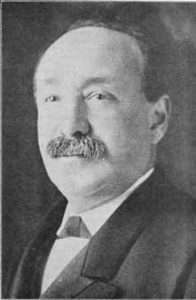Attorney General: Charles Joseph Bonaparte
“To have a popular government we must, first of all, and before all else, have good citizens.”
—Charles Joseph Bonaparte
Charles Joseph Bonaparte was born in Baltimore, Maryland, on June 9, 1851. He graduated from Harvard College in 1871 and from Harvard Law School in 1874. He was admitted to the Maryland bar. Bonaparte was appointed a member of the Board of Indian Commissioners in 1902. For a number of years he was a member of the Board of Overseers of Harvard College, and was one of the organizers and president of the National Municipal League. For several years he was chairman of the Council of the National Civil Service Reform League. Bonaparte was a presidential elector for Maryland on the Republican ticket in 1904, the only Republican elected. On July 1, 1905, he was appointed Secretary of the Navy. President Roosevelt appointed him Attorney General of the United States on December 17, 1906, which office he held until March 4, 1909. He died at his estate, Bella Vista, near Baltimore, on June 28, 1921.
Updated November 4, 2014
In: justice.gov
Bonaparte was born in Baltimore, Maryland on June 9, 1851, the son of Jerome (“Bo”) Napoleon Bonaparte, (1805–1870) and Susan May Williams (1812–1881), from whom the American line of the Bonaparte family descended, and a grandson of Jérôme Bonaparte, the youngest brother of French Emperor Napoleon I and King of Westphalia, 1807–1813. However, the American Bonapartes were not considered part of the dynasty and never used any titles.
In: wikipedia
Charles Joseph Bonaparte, who served as U.S. attorney general under president theodore roosevelt, was one of the organizers of the Civic Reform League and the National Municipal League, and he helped to found a Special Agents Force within the justice department that was the forerunner of the federal bureau of investigation (FBI).
A grandson of Jerome Bonaparte, who was Napoleon’s youngest brother, Charles Joseph Bonaparte was born in Baltimore, Maryland, on July 9, 1851. After graduating from Harvard College in 1871, he attended Harvard Law School, graduating in 1874. Bonaparte returned to Baltimore and established a private practice. At the time, public corruption of elected officials was widespread in the United States and the political situation in Maryland was considered to be the worst in the country. Bonaparte, of Italian-American descent, became interested in civic reform, commenting in an article published in Forum magazine that the politicians of that period if not technically criminals themselves, were the “allies and patrons of habitual lawbreakers.”
Read more at: encyclopedia.com

